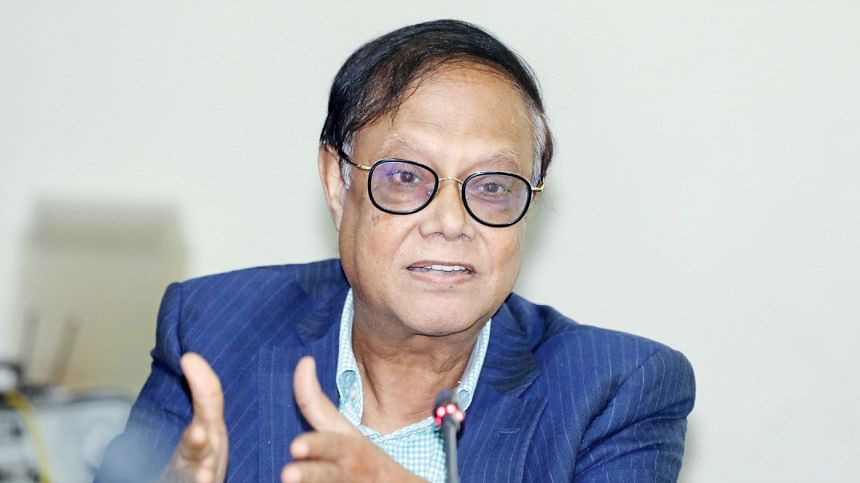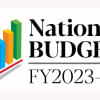No way but to unveil a restrained budget

Despite being the last budget before the next general election, the government has little scope to unveil a big spending plan for the next fiscal year owing to limited fiscal space driven by lower-than-expected revenue collection, a noted economist said.
"Any political government wants to spend more before the national election. But this year, the government has very limited fiscal space," said Ahsan H Mansur, executive director of the Policy Research Institute of Bangladesh, in an interview with The Daily Star recently.
"The government must be restrained in the upcoming budget. It is not possible to increase expenditures like in the previous years. The government will not have the opportunity to spend big."
Finance Minister AHM Mustafa Kamal is set to unveil the budget for 2023-24 on Thursday.
And Mansur said the government is going to present the new budget against the backdrop of twin major challenges: macroeconomic stress and revenue shortfall.
The macroeconomic challenge was brought in primarily by external factors, namely the fallout of the dragging coronavirus pandemic and the outbreak of the Russia-Ukraine war. But the impacts were exacerbated by structural problems in the domestic economy.
The former economist of the International Monetary Fund (IMF) said the government has been in power for nearly 15 years, and had it taken the necessary measures, the ongoing challenge would not have emerged.
"The current situation has not been created in a day. Slowly but surely, we are moving in the wrong direction. But getting out of the current situation will not be possible overnight. There is no magic in the hands of the government."
Mansur said the failure in attaining the revenue target has been a recurrent problem but it has been intensified in FY23 due to the macroeconomic instability.
"It shrank every year. The shrinkage was a little faster this fiscal year. This has squeezed the government's fiscal space and the capacity to spend."
According to Mansur, the government is aware of the issues and knows its limitations.
"It looks like the government is going to give a restrained budget. In terms of figures, it's up around 12.5 per cent from the current fiscal year. But it usually goes up by 17 per cent."
The budget under the annual development programme (ADP) grew more than 17 per cent in the past. But in FY24, the growth would be about 6 per cent.
Apart from lower revenue generation, factors that are holding the government from introducing a bigger budget include higher subsidy spending and interest expenses.
In FY24, the government will have to set aside more than Tk 1 lakh crore to meet interest expenditures while subsidies and incentives will go up to Tk 1 lakh crore from FY23's Tk 82,000 crore.
The administrative expenditure of the government will be Tk 1 lakh crore.
The budget for the social safety net programmes will have to be increased from the current fiscal year's more than Tk 1 lakh crore, said Mansur.
Despite the rise in expenditures, the revenue generation has not gone up proportionately.
In FY24, the National Board of Revenue (NBR) is likely to be given the task of collecting Tk 430,000 crore, which is 16 per cent higher than the current fiscal year's revenue target.
But the tax authority is already staring at missing the revenue generation goal of Tk 330,000 crore set for FY23.
"The NBR has no scope to do much overnight to accelerate revenue collection," Mansur said.
The economist said the IMF's $4.7-billion loan programme can help the country tackle the current macroeconomic challenges.
"The government should clearly state what reforms it is going to undertake in the next fiscal year. The reforms should include tax automation and tax policy," he said, adding that international experts should be involved in the process to bring about standard reforms.
He thinks it will take one year to prepare for the implementation of the reforms attached to the loan programme.
"There is no rush and the programme would have to be implemented in four to five years. But, the work to implement it has to be started first."
Amid lower revenue generation and limited fiscal space, austerity measures were expected in FY23 and the finance minister also targeted stopping or reducing import-dependent and less important government expenditures as well as slowing down the pace of implementation of low-priority projects to the effect.
But Mansur said he did not see any major progress in bringing down expenses.
He also said the opportunity that looks to bring back money that went abroad is not going to give the expected returns.
"I hope the government will not continue it in FY24 as it is impractical."

 For all latest news, follow The Daily Star's Google News channel.
For all latest news, follow The Daily Star's Google News channel. 








Comments